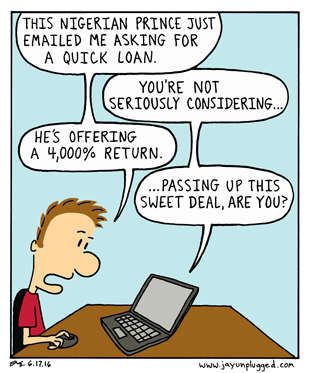 My book club just finished reading and discussing a book called I Do Not Come to You by Chance, which is set in Nigeria and written by Nigerian author Adaobi Tricia Nwaubani. What’s fascinating about the story is that it takes the reader inside the world of Nigerian 419 scammers (419 refers to the Nigerian Criminal Code section that deals with fraud, charges and penalties for offenders). Such advance fee scams are simply a confidence trick: the victim is promised a share of a large sum of money in return for a small upfront payment, which the fraudulent operator says is needed to obtain the large sum. More fees may be requested after the first payment, or the fraudster will just disappear.
My book club just finished reading and discussing a book called I Do Not Come to You by Chance, which is set in Nigeria and written by Nigerian author Adaobi Tricia Nwaubani. What’s fascinating about the story is that it takes the reader inside the world of Nigerian 419 scammers (419 refers to the Nigerian Criminal Code section that deals with fraud, charges and penalties for offenders). Such advance fee scams are simply a confidence trick: the victim is promised a share of a large sum of money in return for a small upfront payment, which the fraudulent operator says is needed to obtain the large sum. More fees may be requested after the first payment, or the fraudster will just disappear.
You’ve probably received one of those spam emails from a Nigerian government official asking you to help with a complex financial transaction and quickly hit the delete button because it sounded so absurd (see examples here). However, enough people from all over the world take the bait, which generates enormous wealth for some individuals. Law enforcement in the U.S. and abroad have had little success in shutting down these operations.
The book’s main character, Kingsley Ibe, is a young man with a good education who doesn’t have the political connections to get a proper job in Nigeria. After his father dies, he feels an obligation to support his family and ends up working for his Uncle Boniface, whose nickname is Cash Daddy. Cash Daddy is making a fortune running an email scam empire. The story reveals the process, step-by-step, by which both gullible and greedy people are seduced into participating in the schemes. Readers also gain some insight into the victims’ behavior and a better understanding of how and why 419ers are such a large industry (some say the third largest) in Nigeria.
You still might be asking yourself, “Who falls for this stuff?” Experts who’ve studied financial fraud agree that there’s no easy answer. Researchers find no correlation between a person’s age, race, gender, educational level or financial literacy and their likelihood of being ripped off by scammers like the 419ers. Different kinds of fraud seem to work on different types of people.
One thing the experts do agree on is that consumers are less rational (and therefore more vulnerable to bad decision-making) when they’re in an emotional state of arousal. So, if you’re a little too excited about an offer, you’re probably not thinking clearly. That’s the best time to take a step back, seek advice from a friend or family member and do your homework before parting with any money.
